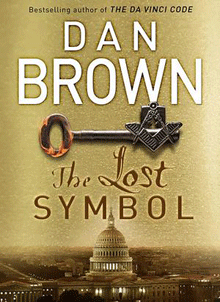The Lost Symbol by Dan Brown

Let's be really really clear on this. I only read this book because I was asked to review it! It's not the sort of book I usually read - a thriller, and a popular title… Something I usually classify as an "Airport" novel. Which is fine, as long as you have a 20-hour flight ahead of you and nothing better to do!
Having read this book, I can understand the temptation. It is a very easy read, not taxing the brain much at all. The characters are almost see-through, the plot is predictable, and twists and turns are loudly telegraphed. For example, everyone knows what train they are on… will they be caught? No! They are on a different train…
I never read The Da Vinci Code, but Robert Langdon is back, the same Harvard symbologist called in to unravel the mysterious images and save the world. This time the location is Washington, and all the action happens in one very very long night! This time the context is freemasonry rather than the Vatican.
My initial reaction was that paying attention to this book might give it more focus than it was worth. Certainly my impression is that the book is not worthy of its popularity, and Dan Brown has profited from past controversy.
My other pre-conceived idea was that Christians would be better off treating this book for what it is: fiction, and not respond to it as non-fiction. However, I have changed my opinion.
There are two reasons why I think we need to have a ready defence to this book.
Firstly, the FACT page at the beginning gives the impression that this is historical fiction; and all the way through there are quotes from the "Harvard Professor" that are presented as truth. One enormous clanger is the claim that the biblical use of "Amen" at the end of prayers is actually a reference to the Egyptian god Amun. There is no doubt however that it refers to the Hebrew for "so be it" or "truly".
Secondly, the last couple of chapters of the book read more like an essay for Brown's own version of religion, and really play no legitimate part in the book. It therefore deserves rebuttal.
Brown misquotes the Bible, and makes conspiracy allegations against the church to build a picture of all religions being equal and teaching that God is within humans. All that is required is special knowledge, and a correct interpretation of the sacred texts, for humans to increase their spiritual power and wisdom.
In the end I was increasingly frustrated by the errors and fallacies portrayed as truth.
Ben Witherington has made an excellent and extensive rebuttal on Beliefnet; but here are some fast responses if you get into a conversation with others about this book:
"¢ Brown often quotes from Gnostic texts, such as the Gospel of Mary, but refers to it as "the Bible".
"¢ He often quotes out of context and makes misleading links, for example, claiming that "your body is a temple" means that God is within us all, that is, we are all divine.
"¢ In fact the message is that humans are empowered to be superhuman. That is, that we can surpass God. This is plainly idolatry; not a new religion, but an ancient one.
"¢ The notion of a one-world religion (as embraced by the masons) ignores that most religions are theologically and culturally incompatible.
"¢ Brown's "special knowledge" religion favours the intellectually superior. The Christian Gospel is far simpler: we are all sinful and simply have to believe in the substitutionary death of God's son Jesus to enable relationship with God. Jesus said children can show us the way.
"¢ True religion is not about improving ourselves, but about giving God the honour that is due to him.
Dan Brown is making the same mistake as Adam and Eve: promoting the seeking of special knowledge to become more like God. It's an attractive message that clouds an unremarkable story.
























